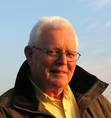Bryan Islip's Blog, page 29
November 15, 2012
Speed bonnie bridge
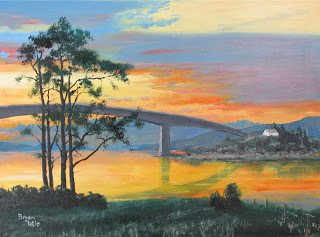
I find the best antidote to worry is to create something. Could be my latest chapter, or an edit of my novel in progress or a painting such as this latest oil on 60 x 46cm canvas that I will call Sunset over the sea to Skye, or it could even be the 'associated' verse that I always compose during or after a painting is done and dusted. Anything to prevent my mind from circling round and around the dreaded cancer, or more accurately the 'non-Hogkinson's lyphoma' from which Delia is suffering.
I did the original sketches and took photos back in the early summer, having driven across on to the island and turned left.
The sunset is a different sketch as are the scottish pines in the forground. For me composition is more than half the battle/ I have little desire to paint exactly what is there. The pines for instance are the clump you will see on the right hand side of the roadway travelling from Ullapool to Inverness - just after you pass the Braemore junction. Bonnie Prince Charlie, speeding in his bonnie boat like a bird on the wing, would have more likely seen these than the deciduous / anonymous trees that are actually there today.
Skye bridge is relatively of recent construction and began its life as a toll bridge. However it rapidly became a free passage under the weight of thousands of local protests. Not everything has to be for money.
A couple of weeks ago I blogged about my previous oil on canvas, the one called 'Starlings'. Looking at it again I see my photo of it was pretty awful so I have shot another one. Here it is ...
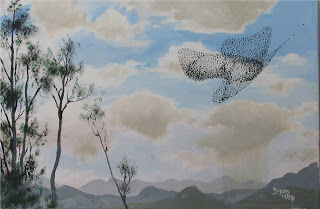

Published on November 15, 2012 04:44
November 14, 2012
Less power to the people
A gentleman asked me to support the public protest against a wind turbine to be sited at Mellon Udrigle - one of the more seascapes in Scotland, (which could mean in the world). This is my response. I'd like to share it with you ...
"Thank you for the opportunity to register my
protest against the Mellon Udrigle wind turbine. I am happy to do so but
unfortunately my cut and paste effort to get on site failed for some reason.
I'll try again later on.
Ah, the vexed question of those damn great
three-armed monoliths fast beeeding all over these islands - especially in the
remoter, less inhabited, more unspoiled regions. (Of course these are the places
where they can and do wreck the environment the most and at the same time attract the least
residential opposition!)
At first I confess to having had mixed feelings on
the subject of wind farms. Anything but nuclear, thought I, (and still do). Then
I looked out of my window on Loch Ewe and considered the trillions of tonnes of
sea water sloshing to and fro out there twice daily. The power within. And I
looked up at the daytime sky and thought of the trillions of kilowatt
energy beaming down on us. The power on high.
Most of all I thought of humankind's latterday need
for power / energy. I thought of the amount of it we think we 'need' per each
individual on these islands, on this planet Earth; four billions of us when I
was born, rising seven billions a scant seventy eight years later. And in
seventy eight more of these short years?
Flying south to visit our family I looked down on a
trillion street lights and wondered what they were actually for. As a boy I
remember lightless London, cars only with pinprick sidelights. I do not recall
any great hardship or any great inconvenience. I do recall the general air of calm content. Why, I wondered, in an age of
anyone can see anywhere, anyone can talk to anyone through our marvellous
digitalia, why do we need all this travel and the usage of power to do
so? Heathrow is like an ant hill frenzied into mad, hither and thither action by
some snuffling marauder. There's no marauder so what for all the rush and tear,
exactly? Ditto our roadways, in spades.
But if we cannot control ourselves and are happy to
approach the abyss on a wave of well-lit euphoria why not site all the wind
turbines above the cities? That's where the people are who seem to need the
power for their central heating - at whatever cost and to avoid the necessity of donning an extra jumper, I guess - and for all the domestic gadgetry, street
lights, said travel etc etc.
Meantime Hamish, I applaud your efforts. I see
you charging the windmills like Don Quixote, cheered on by me as Sancho Panza.
But you know, if there are enough Don Quixotes ..."
Can anyone please tell me by what logic my response falls down? Please?


"Thank you for the opportunity to register my
protest against the Mellon Udrigle wind turbine. I am happy to do so but
unfortunately my cut and paste effort to get on site failed for some reason.
I'll try again later on.
Ah, the vexed question of those damn great
three-armed monoliths fast beeeding all over these islands - especially in the
remoter, less inhabited, more unspoiled regions. (Of course these are the places
where they can and do wreck the environment the most and at the same time attract the least
residential opposition!)
At first I confess to having had mixed feelings on
the subject of wind farms. Anything but nuclear, thought I, (and still do). Then
I looked out of my window on Loch Ewe and considered the trillions of tonnes of
sea water sloshing to and fro out there twice daily. The power within. And I
looked up at the daytime sky and thought of the trillions of kilowatt
energy beaming down on us. The power on high.
Most of all I thought of humankind's latterday need
for power / energy. I thought of the amount of it we think we 'need' per each
individual on these islands, on this planet Earth; four billions of us when I
was born, rising seven billions a scant seventy eight years later. And in
seventy eight more of these short years?
Flying south to visit our family I looked down on a
trillion street lights and wondered what they were actually for. As a boy I
remember lightless London, cars only with pinprick sidelights. I do not recall
any great hardship or any great inconvenience. I do recall the general air of calm content. Why, I wondered, in an age of
anyone can see anywhere, anyone can talk to anyone through our marvellous
digitalia, why do we need all this travel and the usage of power to do
so? Heathrow is like an ant hill frenzied into mad, hither and thither action by
some snuffling marauder. There's no marauder so what for all the rush and tear,
exactly? Ditto our roadways, in spades.
But if we cannot control ourselves and are happy to
approach the abyss on a wave of well-lit euphoria why not site all the wind
turbines above the cities? That's where the people are who seem to need the
power for their central heating - at whatever cost and to avoid the necessity of donning an extra jumper, I guess - and for all the domestic gadgetry, street
lights, said travel etc etc.
Meantime Hamish, I applaud your efforts. I see
you charging the windmills like Don Quixote, cheered on by me as Sancho Panza.
But you know, if there are enough Don Quixotes ..."
Can anyone please tell me by what logic my response falls down? Please?

Published on November 14, 2012 02:57
November 13, 2012
The food of love?
Apparently this is the sixtieth anniversay of the UK's pop music chart.
This morning the BBC's Breakfast reporter was asking a few primary school boys and girls what they thought about that first (1952) Top of the Pops, Al Martino's Here In My Heart. Those of my own pre-Talking About My Generation generation will know Here In My Heart for the soft, sentimental and beautifully sung love song that it is. 'Wierd', however, was the general kiddiewink consensus amidst all the embarrassed giggling, the furtive who is this guy glances one to another.
The reporter then proceeded to interview a few wrinklies on the tea dance floor of the Tower Ballroom, Blackpool. He played then the latest top of the pops, a harshly cacaphonic number by I forget which singer, probably aimed at today's drug fuelled Clubbers. General, genuine bewilderment.
If music be indeed Shakespeare's food of love, where ever has it gone? And what is to replace it for those little children soon to be all grown up and presumably looking as much as did we for that self same love?
Can we have changed all that much in the blink of time's eye which we call sixy years?
Or could it merely be our media induced perceptions that have changed, leaving us just the same 'inside'? I reckon so. I hope so.

This morning the BBC's Breakfast reporter was asking a few primary school boys and girls what they thought about that first (1952) Top of the Pops, Al Martino's Here In My Heart. Those of my own pre-Talking About My Generation generation will know Here In My Heart for the soft, sentimental and beautifully sung love song that it is. 'Wierd', however, was the general kiddiewink consensus amidst all the embarrassed giggling, the furtive who is this guy glances one to another.
The reporter then proceeded to interview a few wrinklies on the tea dance floor of the Tower Ballroom, Blackpool. He played then the latest top of the pops, a harshly cacaphonic number by I forget which singer, probably aimed at today's drug fuelled Clubbers. General, genuine bewilderment.
If music be indeed Shakespeare's food of love, where ever has it gone? And what is to replace it for those little children soon to be all grown up and presumably looking as much as did we for that self same love?
Can we have changed all that much in the blink of time's eye which we call sixy years?
Or could it merely be our media induced perceptions that have changed, leaving us just the same 'inside'? I reckon so. I hope so.

Published on November 13, 2012 00:39
November 8, 2012
Painting rainbows
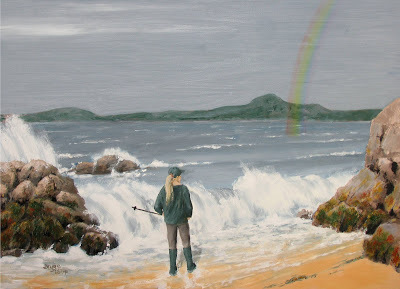
This is my latest completed painting. Oil on canvas 70 x 50cm.
You'll get the analogy if you've seen my blog of a week or three ago - the one about popping around the corner for a litre of milk only to be confronted by a ten foot tall grizzly bear.
Painting rainbows is difficult. Finding your way over them - that's easy, one day, for each and every one of us. And once there, there's no more hurt ... grizzlie bears or otherwise.

Published on November 08, 2012 02:53
November 2, 2012
Talking of War and Peace
Just now I'm re-reading Mailer's The Naked and the Dead, the novel I first read exactly 50 years ago. This has been called the finest to come out of WW2 and maybe the finest since Tolstoi. Mailer's is quite brilliant but in my opinion suffers from adjectival excess and an odd sense of understanding without compassion. I would probably vote for Im Westen nichts Neues - All Quiet on the Western Front - the novel by German veteran of World War I, Erich Maria Remarque; or my oft-quoted favourite, Hemingway's For Whom the Bell Tolls - miles in front for use of words and language; for simply taking you there, like it or not.
Of course these reflections are inspired by the date: 11/11/1911 draws near. I need to remember to buy a poppy. I looked up a compendium of short poems I wrote in I think 1996 and addressed to some of the many poets killed in 'The Great War'. Surely an oxymoron - is there really any thing great in a war, especially that one? Anyway ...
IN WOUNDED FIELDS
Prologue
We
wander down the subterranean shaft
In
which the museum at Albert, Picardy,
Conceals
from this town’s normal life
The
bloody, muddy face
Of
World War One,
The
stinking trenches
And
all the wounded fields.
And
you can hear the dying;.
Taste
the death down here;
In
our strange silence I do not want to stay
Where
no words come
But
find I cannot quickly take myself away....
In
the souvenir shop on the way out
Of
the brick-arch tunnel, cold stone floor,
Before
reaching the fresh air of the town
We
look in silence still
Through
sickly memorabilia
And
at the history books:
And
from a nice French lady buy one
Called; “Violets from Oversea;”
By
Toni and Valmai Holt
(Illustrations
Charlotte Zeepvat)
That
tells how from chaos flowered poesy,
Avoids
the use of the word ‘hero,’
Of
poets speaks without hypocricy.
And
outside in the thin October rain
As
I look high up to the golden virgin,
Child
in her outstretched hands, against grey sky,
That
surmounts the Town Hall
(Known
to the soldiers as The Angel of Albert,)
And
later, reading of those soldier poets -
I
know I have to say some thing.
To
some of them, anyway.
Bryan
Islip
October
96
Note: Words italicised throughout In Wounded Fields are those of the subject poet.
To Charles Hamilton Sorley;
19 May 1895 - 28 April 1915
Hello
pale youth, lip touched with thin moustache,
Captain,
D Company, Suffolk
Regiment,
Cross-Wiltshire
running old Marlburian:
At
you fast sped the unkind spinning lead
At
Loos to drill your helmet, still so new.
How
all too true your words of how...“Earth...
Shall rejoice and blossom too
When the bullet reaches you.”
Wherever
did you stow your socialism,
Your
bitter sense of anti-Kiplingism?
When
you packed up your old kit-bag, and where
Your
liking for Goethe & Rilke, Ibsen?
(Not
for Hardy, your love of him had lapsed)
Your
marchers...”All the hills and vales
along...
The singers are the chaps
Who are going to die perhaps.”
But
listen, you could have been one of those
Pieces of living pulp you so dreaded having
To
carry back across that no-man’s waste:
Or
one of those with you at Ypres who
Had
breathed deep of the gently shifting breeze,
Blinked,
blinded by its gift of British gas,
Coughed
out their sightless time in yellow pus.
You
could have been...have been the dramatist,
The
best, John Masefield, Poet Laureate said,
Since
that Stratfordian, if you had lived.
“I am giving my body,” you wrote, (I
think
He’d
like your shocking words,) “To fight
against
The most enterprising
nation in the world”
But
Charles how straight you stood, your flag unfurled!
Sighing,
you folded; sank spent-muscled down
Into
that slime and no-one said soft things:
No
bands of angels took thee to thy rest.
They
never found you, Captain Sorley, did they?
Though
lost you not for minds cannot decay,
And
you would know, sweet twenty, soldier prince,
It
matters not in what dark earth you lay...
...And
after in your muddy kitbag there
They
found your cry against what Brooke had said:
Your
cry; “Say only this; that they are dead.”
****
To:
Leslie Coulson July 1889 -
October 1916
“Who spake the Law that men
should die in meadows?”
You
ask and I reply, ‘Man spake that Law,’
(Though
in regards to other than himself;)
And
in pursuance since the dawn of human
Kind
has killed and died in meadows, towns
Upon
the seas and hills, now in the air
And
after questioned why, and was it fair.
Why? No-one knows - and fair? Who is to care?
“Who spake the word that
blood should splash in lanes?”
You
ask and I reply, ‘You spake that word,
You,
Sergeant, for by just being there -
Proud
member of the London Regiment
Retreating
last from lost Gallipoli
-
With all those men, some khaki some in grey
Who’ll
fight until one colour wins the day
‘Till
thick in lanes the dead, the dying lay.
“Who gave it forth that
gardens should be boneyards?”
You
ask and I say it was ever thus,
Beneath
the beauty always lie the bones
That
nourish it, upon which it must feed
As
feeds nobility in war upon the lost,
The
crying of the dead, the awful dying:
You
who vainly fought, near Albert lying,
Your
bones now ‘neath the nodding flowers, sighing.
“Who spread the hills with
flesh and blood and brains?”
You
ask and know the answer: it is you
Who
trained your smoking gun upon the foe,
Who
covered hills with screaming shot and shell
To
deaden all that runs or flies or grows.
For
more than this ask your creator God,
Your
fingers stiffly clawed into the sod,
‘Till
agony is spent with all your blood.
‘All the blood that war has
ever strewn is
But a passing stain,’ you wrote... before the
start...
*****
To Francis Ledwidge August 1887 - July 1917
Did
you still, “Hear roads calling and the
hills
And the rivers, wondering
where I am,”
At
Hellfire Corner, sitting drinking tea
As
arced unseen that deadly mortar bomb
Which
was to end an Irish poet’s dream?
A
long way sure, from Owen, Brooke, and those
Smart
young men in smarter khaki clothes
Who
never mended any metalled road
Yet
were your brothers of the silken verse
And
knew as well as you the smell of death.
I
wonder what became of all your clan
(Nine
children to evicted farming man:)
Perhaps
your father was a dreamer too,
Dreaming, “Songs of the fields,” just as you,
His
Celtic longing more than mind can bear.
But
what genetic streak of ancient Gael
Gave
will to write and sensitivity
To
know; “And greater than a poet’s fame
A little grave that has no
name;” tell me,
You
school-less twelve year old adrift, tell me,
Lance
Corporal Francis Ledwidge, fighting man,
Sometime
Slane Corps of Irish Nationalists
Now
Inniskilling Fusiliers, enrolled
To
kill the foe of She who’s not your friend
And
fight for her through hell’s Gallipoli.
And
how, I wondered, could a poet write
In
winter trenches on the brutal Somme
Of
lilting “Fairy Music” (“Ceol Sidhe”)?
Was
still the barred cuckoo so real to you,
In
Crocknahara meadows by the Boyne?
Always
you yearned for mother, Ireland,
“The fields that call
across the world to me,”
And
now near where the spires of Ypers stand
You
dream your dreams, denied reality,
Beneath
your wild flowers ‘till the end.
****
To Roland Aubrey Leighton:
March 1895 - December 1915
We
searched the lanes, found you in Louvencourt’s
Small
cemetry amidst a company
Of
stones standing straight-rowed to attention,
Smart
white in a slow rain, near where you died;
‘Lieutenant
R A Leighton 7th Worcesters,’
Says
your monument; said that telegram.
“I walk alone although the
way is long,”
You
said, in private lines in your black book,
“And with gaunt briars and
nettles overgrown;”
What
pain you meant by this we’ll never know.
Just
such a light so bright as yours aligns
The
many-splendoured ones on which it shines.
She
capitalised your ‘Him’ as godheads do
Whenever
afterwards she wrote of you.
Yes,
“Life is love and love is you, dear, you”
You
wrote, prize scholar bursting sweating out
Of
your illicit wet night dreams of she,
Who’d
written to herself ;’Impressive, he,
Of
powerful frame, pale face and stiff thick hair.’
Would
you we know had she not loved you so?
Dee likes to know you in those violets,
Pressed
brown and withered, desiccated now,
You
sent to Vee from shattered 'Plug
Street' Wood,
Picked
from red sticky ground around the head,
The
horrid face and splintered skull that she
Must
never see?... She, Vera of the V A D?
Who,
from your sceptic pact with her enticed
Your
secret taking of Rome’s
hand of Christ?
And
I, not knowing of you very much,
Looked
in that brass bound book at Louvencourt
Read
this year’s batch of private messages
To
you, young friend, mostly from those unborn
When
that one, shiv’ring in his field grey,
Unsurprised
to see you that cold night, glad
Of
the Christmas gift, squeezed the steel trigger,
Exploding
pain into your youthful frame...
From
far and wide they’d come to speak their grief,
So
many words to you who wrote so few.
Why
stood you there, why dare the guns, Roland?
‘Hinc illae lacrimae;’* your code...
I
still don’t understand....
* Hence those
tears’ .... (Terence)
****
To: John McRae: November
1872 - January 1918
Youth
steals away from all who live, McRae,
Though
weary not the sons the Highlands yields,
Canadian
now (except on Empire Day,)
You’re
‘uncle’ to the boys in Flanders’ fields.
You
wrote; “In Flanders
Fields the poppies blow;”
And
midst the dogs of war you heard the lark,
Went
on; “We shall not sleep, though poppies
grow,”
(If
generations new allow the dark.)
They
say you wrote it by first morning light
One
bloody Ypres day in May, ‘15,
As
German chlorine robbed men of their sight,
Oh,
few men see what you, Doctor, have seen -
Seen
six out of each ten Canadians
Sans
life sans love sans laughter; sans all sans...
Did
you, Lieutenant Colonel John McRae,
Veteran
of Boer war, Loos and Passchendaele,
For
them your prayers say each dying day?
Your
healing hands artillery did lay?
But
did, for you, sometimes the tumult fade,
Did
agonies relent as words unfold?
Recalled
within your notebook was peace made;
“A little maiden fair /
With locks of gold.”?
And
left you more than she a-weeping and,
Before
the war fell you for Lady R...?
Why
never did you let a wedding band
Be-threat
the edge of sword Excalibre?
I
hope you filled life’s chalice to the brim -
And
that you knew not Haig, but pitied him.
Then
April, seventeen; with crimson end
Was
Canada,
enobled nation made -
On
Vimy Ridge. And afterwards you penned;
“The Anxious Dead;” and you were not afraid.
Oh
Jack McRae, few men were loved as you:
Men
clung to you as shadows cling to men;
Still
wear your poppies to hold glorious who
Found
glory in a dark beyond their ken.
The
horse you cherished led your black cortege,
Turned
boots in stirrup irons to say you’re dead,
Men's
tears at Wimereux were not of rage
But
love for one ashamed to die in bed...
And
in the going down of every sun
Some
shall recall your words each one by one.
Called MacUrtsi was each
poet to your clan,
Goodbye Doctor, MacUrtsi, McRae, Man.
****
IN
WOUNDED FIELDS
Epilogue
And
so I had my discourse with these poets
And
with the others from that book
Who’d
gone to war with heads held high but knew
Scant
glory in the mud, and died,
Yet
found their songs and verse
In
such a torrent rushed
As
might have changed the world
I
thought of how wild flowers
In
brightest beauty blaze
Where
ordure thickest lies -
It's
stink by glory overpowered.
This
place of peace holds very little trace
Of
what had come to pass those years before.
But
rust away as may the swords
I
shall remember poet’s words
And
we shall remember them
Long
after all the blood and all the bedlam,
Long
after time has healed the wounded fields.
Bryan
Islip
October
96


Of course these reflections are inspired by the date: 11/11/1911 draws near. I need to remember to buy a poppy. I looked up a compendium of short poems I wrote in I think 1996 and addressed to some of the many poets killed in 'The Great War'. Surely an oxymoron - is there really any thing great in a war, especially that one? Anyway ...
IN WOUNDED FIELDS
Prologue
We
wander down the subterranean shaft
In
which the museum at Albert, Picardy,
Conceals
from this town’s normal life
The
bloody, muddy face
Of
World War One,
The
stinking trenches
And
all the wounded fields.
And
you can hear the dying;.
Taste
the death down here;
In
our strange silence I do not want to stay
Where
no words come
But
find I cannot quickly take myself away....
In
the souvenir shop on the way out
Of
the brick-arch tunnel, cold stone floor,
Before
reaching the fresh air of the town
We
look in silence still
Through
sickly memorabilia
And
at the history books:
And
from a nice French lady buy one
Called; “Violets from Oversea;”
By
Toni and Valmai Holt
(Illustrations
Charlotte Zeepvat)
That
tells how from chaos flowered poesy,
Avoids
the use of the word ‘hero,’
Of
poets speaks without hypocricy.
And
outside in the thin October rain
As
I look high up to the golden virgin,
Child
in her outstretched hands, against grey sky,
That
surmounts the Town Hall
(Known
to the soldiers as The Angel of Albert,)
And
later, reading of those soldier poets -
I
know I have to say some thing.
To
some of them, anyway.
Bryan
Islip
October
96
Note: Words italicised throughout In Wounded Fields are those of the subject poet.
To Charles Hamilton Sorley;
19 May 1895 - 28 April 1915
Hello
pale youth, lip touched with thin moustache,
Captain,
D Company, Suffolk
Regiment,
Cross-Wiltshire
running old Marlburian:
At
you fast sped the unkind spinning lead
At
Loos to drill your helmet, still so new.
How
all too true your words of how...“Earth...
Shall rejoice and blossom too
When the bullet reaches you.”
Wherever
did you stow your socialism,
Your
bitter sense of anti-Kiplingism?
When
you packed up your old kit-bag, and where
Your
liking for Goethe & Rilke, Ibsen?
(Not
for Hardy, your love of him had lapsed)
Your
marchers...”All the hills and vales
along...
The singers are the chaps
Who are going to die perhaps.”
But
listen, you could have been one of those
Pieces of living pulp you so dreaded having
To
carry back across that no-man’s waste:
Or
one of those with you at Ypres who
Had
breathed deep of the gently shifting breeze,
Blinked,
blinded by its gift of British gas,
Coughed
out their sightless time in yellow pus.
You
could have been...have been the dramatist,
The
best, John Masefield, Poet Laureate said,
Since
that Stratfordian, if you had lived.
“I am giving my body,” you wrote, (I
think
He’d
like your shocking words,) “To fight
against
The most enterprising
nation in the world”
But
Charles how straight you stood, your flag unfurled!
Sighing,
you folded; sank spent-muscled down
Into
that slime and no-one said soft things:
No
bands of angels took thee to thy rest.
They
never found you, Captain Sorley, did they?
Though
lost you not for minds cannot decay,
And
you would know, sweet twenty, soldier prince,
It
matters not in what dark earth you lay...
...And
after in your muddy kitbag there
They
found your cry against what Brooke had said:
Your
cry; “Say only this; that they are dead.”
****
To:
Leslie Coulson July 1889 -
October 1916
“Who spake the Law that men
should die in meadows?”
You
ask and I reply, ‘Man spake that Law,’
(Though
in regards to other than himself;)
And
in pursuance since the dawn of human
Kind
has killed and died in meadows, towns
Upon
the seas and hills, now in the air
And
after questioned why, and was it fair.
Why? No-one knows - and fair? Who is to care?
“Who spake the word that
blood should splash in lanes?”
You
ask and I reply, ‘You spake that word,
You,
Sergeant, for by just being there -
Proud
member of the London Regiment
Retreating
last from lost Gallipoli
-
With all those men, some khaki some in grey
Who’ll
fight until one colour wins the day
‘Till
thick in lanes the dead, the dying lay.
“Who gave it forth that
gardens should be boneyards?”
You
ask and I say it was ever thus,
Beneath
the beauty always lie the bones
That
nourish it, upon which it must feed
As
feeds nobility in war upon the lost,
The
crying of the dead, the awful dying:
You
who vainly fought, near Albert lying,
Your
bones now ‘neath the nodding flowers, sighing.
“Who spread the hills with
flesh and blood and brains?”
You
ask and know the answer: it is you
Who
trained your smoking gun upon the foe,
Who
covered hills with screaming shot and shell
To
deaden all that runs or flies or grows.
For
more than this ask your creator God,
Your
fingers stiffly clawed into the sod,
‘Till
agony is spent with all your blood.
‘All the blood that war has
ever strewn is
But a passing stain,’ you wrote... before the
start...
*****
To Francis Ledwidge August 1887 - July 1917
Did
you still, “Hear roads calling and the
hills
And the rivers, wondering
where I am,”
At
Hellfire Corner, sitting drinking tea
As
arced unseen that deadly mortar bomb
Which
was to end an Irish poet’s dream?
A
long way sure, from Owen, Brooke, and those
Smart
young men in smarter khaki clothes
Who
never mended any metalled road
Yet
were your brothers of the silken verse
And
knew as well as you the smell of death.
I
wonder what became of all your clan
(Nine
children to evicted farming man:)
Perhaps
your father was a dreamer too,
Dreaming, “Songs of the fields,” just as you,
His
Celtic longing more than mind can bear.
But
what genetic streak of ancient Gael
Gave
will to write and sensitivity
To
know; “And greater than a poet’s fame
A little grave that has no
name;” tell me,
You
school-less twelve year old adrift, tell me,
Lance
Corporal Francis Ledwidge, fighting man,
Sometime
Slane Corps of Irish Nationalists
Now
Inniskilling Fusiliers, enrolled
To
kill the foe of She who’s not your friend
And
fight for her through hell’s Gallipoli.
And
how, I wondered, could a poet write
In
winter trenches on the brutal Somme
Of
lilting “Fairy Music” (“Ceol Sidhe”)?
Was
still the barred cuckoo so real to you,
In
Crocknahara meadows by the Boyne?
Always
you yearned for mother, Ireland,
“The fields that call
across the world to me,”
And
now near where the spires of Ypers stand
You
dream your dreams, denied reality,
Beneath
your wild flowers ‘till the end.
****
To Roland Aubrey Leighton:
March 1895 - December 1915
We
searched the lanes, found you in Louvencourt’s
Small
cemetry amidst a company
Of
stones standing straight-rowed to attention,
Smart
white in a slow rain, near where you died;
‘Lieutenant
R A Leighton 7th Worcesters,’
Says
your monument; said that telegram.
“I walk alone although the
way is long,”
You
said, in private lines in your black book,
“And with gaunt briars and
nettles overgrown;”
What
pain you meant by this we’ll never know.
Just
such a light so bright as yours aligns
The
many-splendoured ones on which it shines.
She
capitalised your ‘Him’ as godheads do
Whenever
afterwards she wrote of you.
Yes,
“Life is love and love is you, dear, you”
You
wrote, prize scholar bursting sweating out
Of
your illicit wet night dreams of she,
Who’d
written to herself ;’Impressive, he,
Of
powerful frame, pale face and stiff thick hair.’
Would
you we know had she not loved you so?
Dee likes to know you in those violets,
Pressed
brown and withered, desiccated now,
You
sent to Vee from shattered 'Plug
Street' Wood,
Picked
from red sticky ground around the head,
The
horrid face and splintered skull that she
Must
never see?... She, Vera of the V A D?
Who,
from your sceptic pact with her enticed
Your
secret taking of Rome’s
hand of Christ?
And
I, not knowing of you very much,
Looked
in that brass bound book at Louvencourt
Read
this year’s batch of private messages
To
you, young friend, mostly from those unborn
When
that one, shiv’ring in his field grey,
Unsurprised
to see you that cold night, glad
Of
the Christmas gift, squeezed the steel trigger,
Exploding
pain into your youthful frame...
From
far and wide they’d come to speak their grief,
So
many words to you who wrote so few.
Why
stood you there, why dare the guns, Roland?
‘Hinc illae lacrimae;’* your code...
I
still don’t understand....
* Hence those
tears’ .... (Terence)
****
To: John McRae: November
1872 - January 1918
Youth
steals away from all who live, McRae,
Though
weary not the sons the Highlands yields,
Canadian
now (except on Empire Day,)
You’re
‘uncle’ to the boys in Flanders’ fields.
You
wrote; “In Flanders
Fields the poppies blow;”
And
midst the dogs of war you heard the lark,
Went
on; “We shall not sleep, though poppies
grow,”
(If
generations new allow the dark.)
They
say you wrote it by first morning light
One
bloody Ypres day in May, ‘15,
As
German chlorine robbed men of their sight,
Oh,
few men see what you, Doctor, have seen -
Seen
six out of each ten Canadians
Sans
life sans love sans laughter; sans all sans...
Did
you, Lieutenant Colonel John McRae,
Veteran
of Boer war, Loos and Passchendaele,
For
them your prayers say each dying day?
Your
healing hands artillery did lay?
But
did, for you, sometimes the tumult fade,
Did
agonies relent as words unfold?
Recalled
within your notebook was peace made;
“A little maiden fair /
With locks of gold.”?
And
left you more than she a-weeping and,
Before
the war fell you for Lady R...?
Why
never did you let a wedding band
Be-threat
the edge of sword Excalibre?
I
hope you filled life’s chalice to the brim -
And
that you knew not Haig, but pitied him.
Then
April, seventeen; with crimson end
Was
Canada,
enobled nation made -
On
Vimy Ridge. And afterwards you penned;
“The Anxious Dead;” and you were not afraid.
Oh
Jack McRae, few men were loved as you:
Men
clung to you as shadows cling to men;
Still
wear your poppies to hold glorious who
Found
glory in a dark beyond their ken.
The
horse you cherished led your black cortege,
Turned
boots in stirrup irons to say you’re dead,
Men's
tears at Wimereux were not of rage
But
love for one ashamed to die in bed...
And
in the going down of every sun
Some
shall recall your words each one by one.
Called MacUrtsi was each
poet to your clan,
Goodbye Doctor, MacUrtsi, McRae, Man.
****
IN
WOUNDED FIELDS
Epilogue
And
so I had my discourse with these poets
And
with the others from that book
Who’d
gone to war with heads held high but knew
Scant
glory in the mud, and died,
Yet
found their songs and verse
In
such a torrent rushed
As
might have changed the world
I
thought of how wild flowers
In
brightest beauty blaze
Where
ordure thickest lies -
It's
stink by glory overpowered.
This
place of peace holds very little trace
Of
what had come to pass those years before.
But
rust away as may the swords
I
shall remember poet’s words
And
we shall remember them
Long
after all the blood and all the bedlam,
Long
after time has healed the wounded fields.
Bryan
Islip
October
96

Published on November 02, 2012 03:21
November 1, 2012
The pale moon is rising
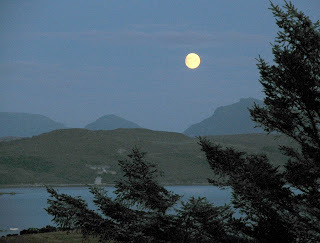
This is a photograph I took one night not so long ago, reminding me of the first line of a song I've sung - to often less than enraptured audiences - in many an alcoholic gathering: 'The pale moon is rising above the blue mountains' (the sun is declining beneazth the green sea.) Almost certainly those words are slightly or entirely wrong. Dee says I know a couple of wrong lines in every song ever written. Small exaggeration no doubt, but the lady is inclined to exaggerate and we all have faults do we not? Even she.
I took the photo from outside our home in Aultbea, therefore the water is Loch Ewe and the mountain (or 'hill' as, locally, we call all Scottish mountains) is Beinn Airidh Charr. I often think when looking at this one of our friend M's account of her ascent of it, years ago, probably before Mr Armstrong set first foot on that golden orb up there. She was and we were so much younger and fitter than now. Sigh! But hey, looking back is a mistake and besides, I get as much pleasure from just seeing the hill that was there long before Mankind first set foot on planet earth than were I able to climb it this very day. I wonder if I could? ... well, I know I could try ...
Could Beinn Airidh Charr be the "Beinn Torobach" in my novel in progress? Could be, but then so could Baosbeinn, An Teallach, Beinn Groblach of any one of a half hundred others here on the bewitchingly beautiful West coast of the Highlands of Scotland. The first eighteen chapters are now on line if you're interested, and nineteen of the whole, maybe twenty four, is coming along. Even the Second Coming along, perhaps?

Published on November 01, 2012 10:28
October 30, 2012
Ain't it funny
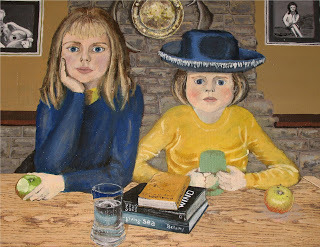
This is an oil painting c 30 x 25 cm. I executed it around 1970, the year we moved south as demanded by my career progression, from Lancashire to Hampshire. However it is possible my two lovely girls, Kairen Jane (left) and Julie Elaine may have been younger than the 14/15 and 11/12 indicated by that date.
It is for some reason unfinished. Strange, that. Any painting I didn't like and didn't finish just never survived and this one has, for it hangs today on my office wall at home.
The background stonework surrounds a fireplace I designed and we had installed in our new home at Lee-on-the-Solent. The pictures on the wall are probably of my first wife Joan. And the books? Dixon's 'Gairloch' (so after our first ever holiday in Scotland), Bellamy's 'The Life Giving Sea' and 'Gone With The Wind'. I like the water glass and I think my daughter's are wondering when Dad would let them get up and get on!
42 long and crowded years gone in a flash; a reminder of our brief stay on earth. As Willie Nelson wrote and sang, ain't it funny how time drifts away.

Published on October 30, 2012 02:38
October 26, 2012
Painting starlings
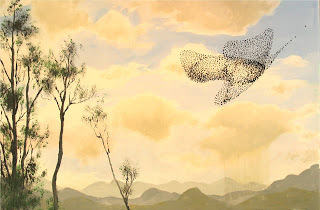
I've begun painting again with oils on canvas. I'd almost forgotten how great is the feel of the stuff - well mixed linseed oil, genuine American turpentine, pigments squeezed straight from the Winsor and Newton tube.
Subject puzzling you? It was prompted by a passage in a recent chapter of my on-line novel in progress, The Book. Teenager Jamie is out fishing a sea loch with Ben, his father, and old boatowner Donny MacLean. Young Jamie is rowing back in ...
Hundred metres left to go. Jamie said, ‘Mister
MacLean, you’ve seen the starlings, haven’t you? On Springwatch or something?
We don’t have TV here but I’ve seen them. Thousands and thousands all flying
packed close together, wheeling about in the sky making kinds of abstract
patterns? They turn like they were all part of one single flying creature but
they are not, they are all individuals so there must always be the one who has
to make decisions, decide to turn first. All the others follow of their own
free will, almost instantaneous. If they didn’t do it together they would
collide with each other. But you can see there’s always one that breaks away
and he or she takes others with him - or her - to make their own patterns.’
‘Starlings?’ The old man shook his head, puzzled.
‘The laddie talks in riddles, Ben.’
Ben grinned. ‘Sometimes I think the riddles make
more sense than anything. As he says, somebody has to make the first turn.
Things do change, Donny. Here or anywhere.’
‘Oh yes. But forget about the starlings before we
hit the jetty,’ Donny said, not unkindly. ‘Stop rowing now and ship your oar.
Ready the painter.’

Published on October 26, 2012 09:12
October 23, 2012
A walk in the sunshine
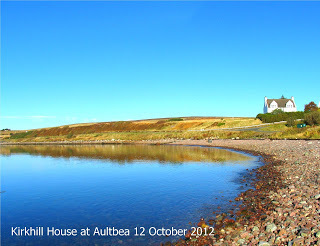
I've often talked of our customary mid-day walk 'to the NATO'. Well, here are a few shots I took during yesterday's ramble up the lochside.But please don't let me give you the impression that such weather is in any way normal, especially at the time of these equinoctal tides. (Half way up in these shots)
Pic 1 shows Kirkhill House, our rented home in Aultbea. The B&B Dee has been running so successfully has now of course put the shutters up, perhaps temporarily depending on progress with Dee's newly diagnosed cancer.
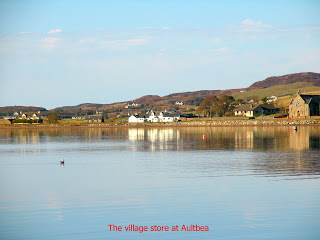
The second picture shows the village store (white buildings) and kirk (church - stone buildingon the right)
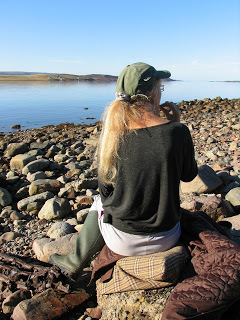
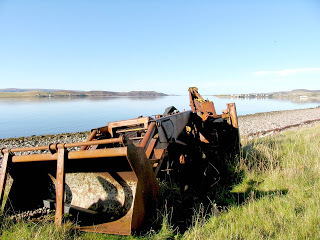
Dee on one of her usual rocky perches. Here is where we sit eating our sandwiches etc, close by the crumbling remains of a wartime gun emplacement. The land across the water is
Isle Ewe - about a mile out into Loch Ewe itself.
And this is a reminder of the quote (probazbly mis-qote) "All the world is beautiful and only Man is vile."
Some bastard - probably military at the end of WW2 when they'd had what they wanted from this area - just left their xxxxxxx earth mover where it broke down and xxxxxxxx off back south. Thank you for nothing, whover you were.

Published on October 23, 2012 02:07
October 18, 2012
Delia sunbathing
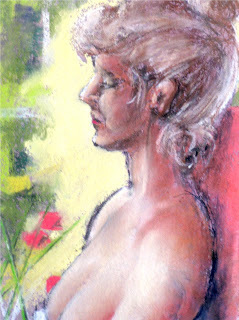
I've recently. been blogging a bit about my wife Delia. This is a ten minute 'impressionist' pastel sketch of her. She is asleep whilst sunbathing in our garden some years ago.
Before we moved to the far north of Scotland, in those innocent days before we learned about skin cancer, Dee was indeed a world class sun worshipper. Lying in the blazing sun smoking cigarette after cigarette was what folk did.
Perhaps oddly enough her current, recently diagnosed bone cancer has nothing whatever to do with the sun - to the best of current klnowledge at least.
The more we learn about cancer and the ways in which it can attack the human physiology the more astonished we are at the enormous complexity of the whole subject. And the more we understand the imprecision of cancer in terms of origination, diagnostics, progrnostics and treatment. No doubt one day all will be revealed. Right now, four long weeks after the firsat hospitalisation we're still struggling to come to terms with it and all its issues.
One thing I will say. If you happen to have any pennies, cents, drachmas, riyals or any other hard currency to spare, they would be extremely spent at Cancer Macmillan

Published on October 18, 2012 07:29

